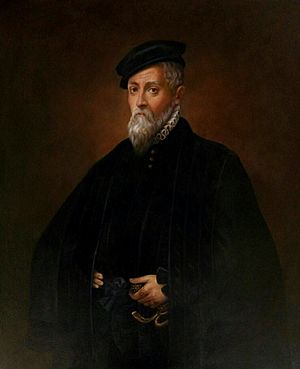Francisco de Vargas y Mexia facts for kids
Quick facts for kids
Francisco de Vargas y Mexia
|
|
|---|---|
 |
Francisco de Vargas y Mexia was an important Spanish diplomat and writer who lived a long time ago. He was born in Madrid, Spain, but we don't know the exact year. He passed away in 1566 at a monastery. He played a big role in Spanish politics and in important church meetings during his time.
Contents
Francisco de Vargas y Mexia: A Spanish Diplomat
Early Life and Career
Francisco came from an old, respected family. He studied law at the University of Alcalá and earned a special degree in law. He became a government official. Because he was very energetic and smart, especially with his legal knowledge, he rose through the ranks. He became a top legal advisor for the King's most important council, called the Council of Castile.
Working with Emperor Charles V
In 1545, Charles V, Holy Roman Emperor, who was a very powerful ruler, sent Francisco to an important church meeting called the Council of Trent. This council was a big gathering of church leaders discussing important religious matters.
In 1548, Francisco spoke up as Charles V's representative. He protested when the council tried to move to a different city, Bologna. Later, in 1551, he was happy when the council returned to Trent.
Ambassador in Venice
From 1552 to 1559, Francisco served as the Spanish ambassador in Venice, Italy. An ambassador is a diplomat who represents their country in another country. This was a very important job, as Venice was a powerful and wealthy city-state at the time.
Important Negotiations
Francisco was involved in many important discussions. In 1558, he talked with Pope Paul IV in Rome. They discussed recognizing Ferdinand I, Holy Roman Emperor as the new emperor. They also talked about creating new church areas, called dioceses, in the Netherlands.
From 1559, Francisco became the Spanish ambassador to the Roman Curia, which is the Pope's government. He played a key role in choosing the next Pope, Pius IV.
When Pope Pius IV started legal action against the family of the previous Pope, Francisco tried to help save them. For a short time, the Pope was not happy with Francisco and tried to have him sent back to Spain. However, Francisco soon regained the Pope's trust. In 1563, Pope Pius IV asked him to write an important paper about the Pope's authority. This was because the Council of Trent was having a disagreement about it.
Francisco wrote a document that strongly supported the Pope's power. He also wrote about another religious question: whether regular people should be allowed to receive wine during communion. He was strongly against it.
His reports and letters from this time give us a lot of information about what happened at the Council of Trent. However, it's important to remember that he was a diplomat working for his king. So, his writings show his king's interests. He was last involved in the council's affairs when he tried to delay its closing.
Later Life
After returning to Spain, Francisco was made a state councilor, which is a high-level advisor to the king. But he soon gave up all his official jobs. He retired to a monastery near Toledo to prepare for his death. People who knew him praised him as a very educated man who supported learning and scholars.
See also
 In Spanish: Francisco de Vargas y Mejía para niños
In Spanish: Francisco de Vargas y Mejía para niños
 | Janet Taylor Pickett |
 | Synthia Saint James |
 | Howardena Pindell |
 | Faith Ringgold |

